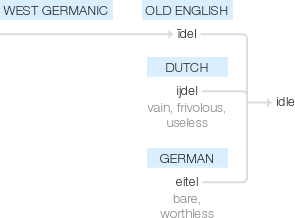Idle
Old English īdel ‘empty, useless’, of West Germanic origin; related to Dutch ijdel ‘vain, frivolous, useless’ and German eitel ‘bare, worthless’.
wiktionary
From Middle English idel, ydel, from Old English īdel, from Proto-Germanic *īdalaz. Cognate with Dutch ijdel(“vain, meaningless”), German Low German iedel(“vain, idle”), German eitel(“vain, conceited”), and possibly Old Norse illr("bad"; > English ill).
etymonline
idle (adj.)
Old English idel "empty, void; vain; worthless, useless," from Proto-West Germanic *idla- (source also of Old Saxon idal, Old Frisian idel "empty, worthless," Old Dutch idil, Old High German ital, German eitel "vain, useless, mere, pure"), a word of unknown origin.
Subsequent developments are peculiar to English: sense "not employed, not doing work" was in late Old English in reference to persons; from 1520s of things; from 1805 of machinery. Meaning "lazy, slothful" is from c. 1300. In Elizabethan English it also could mean "foolish, delirious, wandering in the mind." Idle threats preserves original sense.
idle (v.)
late 15c., "make vain or worthless" (trans.), from idle (adj.). Meaning "spend or waste (time)" is from 1650s. Meaning "cause to be idle" is from 1788. Intrans. sense of "run slowly and steadily without transmitting power" (as a motor) first recorded 1916. Related: Idled; idling. As a noun, 1630s of persons, 1939 of an engine setting.
